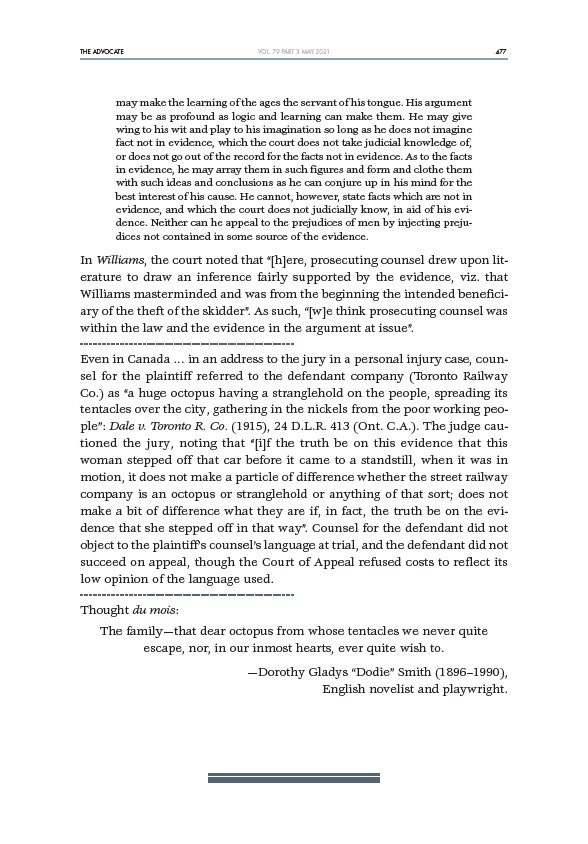
THE ADVOCATE 477
VOL. 79 PART 3 MAY 2021
may make the learning of the ages the servant of his tongue. His argument
may be as profound as logic and learning can make them. He may give
wing to his wit and play to his imagination so long as he does not imagine
fact not in evidence, which the court does not take judicial knowledge of,
or does not go out of the record for the facts not in evidence. As to the facts
in evidence, he may array them in such figures and form and clothe them
with such ideas and conclusions as he can conjure up in his mind for the
best interest of his cause. He cannot, however, state facts which are not in
evidence, and which the court does not judicially know, in aid of his evidence.
Neither can he appeal to the prejudices of men by injecting prejudices
not contained in some source of the evidence.
In Williams, the court noted that “here, prosecuting counsel drew upon literature
to draw an inference fairly supported by the evidence, viz. that
Williams masterminded and was from the beginning the intended beneficiary
of the theft of the skidder”. As such, “we think prosecuting counsel was
within the law and the evidence in the argument at issue”.
Even in Canada … in an address to the jury in a personal injury case, counsel
for the plaintiff referred to the defendant company (Toronto Railway
Co.) as “a huge octopus having a stranglehold on the people, spreading its
tentacles over the city, gathering in the nickels from the poor working people”:
Dale v. Toronto R. Co. (1915), 24 D.L.R. 413 (Ont. C.A.). The judge cautioned
the jury, noting that “if the truth be on this evidence that this
woman stepped off that car before it came to a standstill, when it was in
motion, it does not make a particle of difference whether the street railway
company is an octopus or stranglehold or anything of that sort; does not
make a bit of difference what they are if, in fact, the truth be on the evidence
that she stepped off in that way”. Counsel for the defendant did not
object to the plaintiff’s counsel’s language at trial, and the defendant did not
succeed on appeal, though the Court of Appeal refused costs to reflect its
low opinion of the language used.
Thought du mois:
The family—that dear octopus from whose tentacles we never quite
escape, nor, in our inmost hearts, ever quite wish to.
—Dorothy Gladys “Dodie” Smith (1896–1990),
English novelist and playwright.